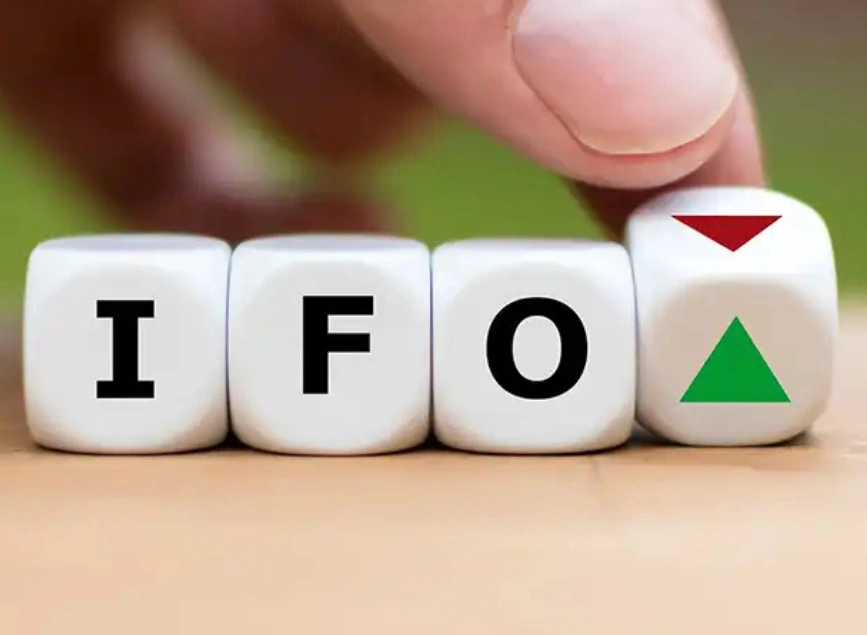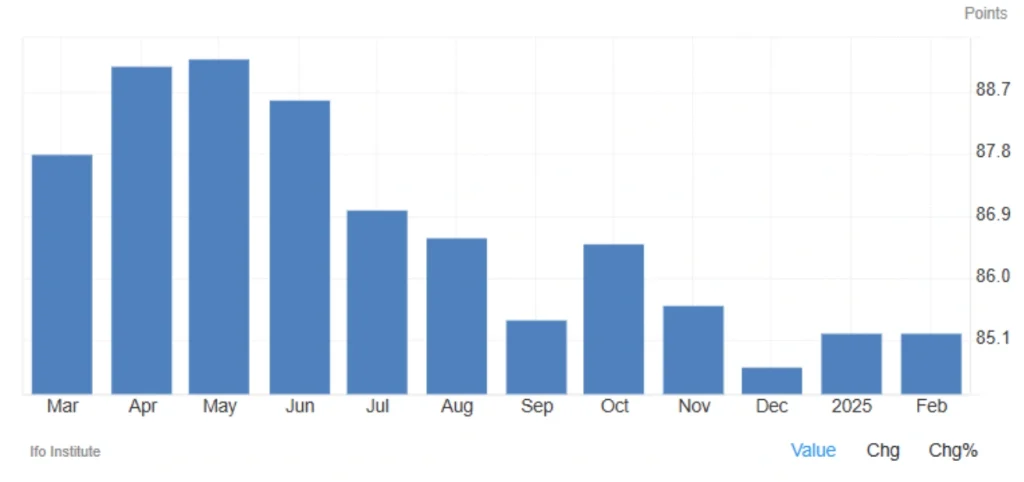
Germany’s Ifo Business Climate Index Holds Steady in 2025
In February 2025, Germany’s Ifo Business Climate Index remained unchanged at 85.2, matching January’s revised figure and falling short of market expectations of 85.8. This stagnant reading reflects persistent uncertainty in Europe’s largest economy, driven by political and global trade concerns.
What Is the Ifo Business Climate Index and Why Does It Matter?
The Ifo Business Climate Index, compiled by the Ifo Institute in Munich, is a leading economic indicator that measures the confidence levels of German businesses across various sectors. It’s considered a key barometer of economic health in Germany and, by extension, the Eurozone.
Breaking Down the Index Components
The index is made up of two key elements:
- Current Conditions Assessment, which gauges how businesses perceive the present economic environment
- Future Expectations, which reflects business outlooks for the next six months
A reading above 100 signals optimism, while a score below 100 indicates pessimism.

February’s Reading: Stability Masks Underlying Concerns
Despite remaining stable at 85.2, the February Ifo reading reveals deeper issues simmering beneath the surface.
Business Sentiment Remains Subdued
Overall, companies stayed cautious, with industrial and manufacturing sectors showing the most pessimism. This mood has been fueled by two significant factors:
- The upcoming German federal elections, which have left businesses wary of future policy changes
- Potential shifts in U.S. trade policy, with fears of new tariffs targeting export-heavy industries like automotive and machinery
A Mixed Bag for Business Expectations
Future expectations rose slightly to 85.4 from 84.3 in January, suggesting a glimmer of cautious optimism. However, the assessment of current conditions slipped to 85.0 from 86.0, reflecting growing concerns about Germany’s immediate economic health.
Why Should Investors and Markets Care?
The Ifo Index doesn’t just reflect business sentiment—it has real effects on financial markets, currency valuations, and central bank policies.
Impact on the Euro and Financial Markets
A stagnant or declining Ifo index often weakens the euro as investors lose confidence in Germany’s economic growth prospects. Declining business sentiment can also drive down German stock prices, particularly in export-heavy sectors like manufacturing. In response to weakening business confidence, the European Central Bank (ECB) may be encouraged to maintain or expand accommodative monetary policies to support economic growth.
Broader Economic Implications for the Eurozone
Germany is the economic powerhouse of the Eurozone, meaning its performance directly influences the region’s overall economic health. A prolonged downturn in German business sentiment could lead to slower growth across the entire Eurozone.
Geopolitical Factors at Play: Elections and Trade Tensions
The looming elections have introduced uncertainty into the market, with businesses concerned about potential shifts in economic policy that could follow a change in leadership.
U.S. Trade Tariff Threats Loom Large
Speculation about new U.S. tariffs, particularly on Germany’s automotive and machinery sectors, has raised concerns among export-reliant companies.
What Could Come Next? A Look Toward the Future
Despite the current pessimism, there’s a hint of cautious optimism for the months ahead, as shown by the slight rise in future expectations.
However, the short-term outlook remains clouded by ongoing political uncertainty surrounding the upcoming German elections, potential disruptions from U.S. trade policies, and concerns about an economic slowdown in key industrial sectors.
ECB’s Likely Response
With the Ifo Index showing no significant improvement, the European Central Bank is likely to maintain its accommodative monetary stance to support economic growth.
Key Takeaways for Investors and Businesses
The Ifo Business Climate Index holding steady at 85.2 reflects ongoing caution in Germany’s economic environment, particularly within manufacturing and industrial sectors. Political uncertainty and global trade tensions continue to weigh on business confidence. A weaker euro and pressure on German stock markets are likely if business sentiment doesn’t improve soon. The European Central Bank is expected to maintain supportive policies to counteract the current slowdown.
Looking ahead, much will depend on the outcome of the German elections and future developments in global trade policy. For now, businesses and investors should remain alert and prepare for potential market shifts.
Share
Hot topics

Best broker for gold trading
There’s always been a certain magic about gold. Before online charts and trading applications, people stored their wealth in coins and bars, trusting that gold would retain its value during...
Read more




Submit comment
Your email address will not be published. Required fields are marked *